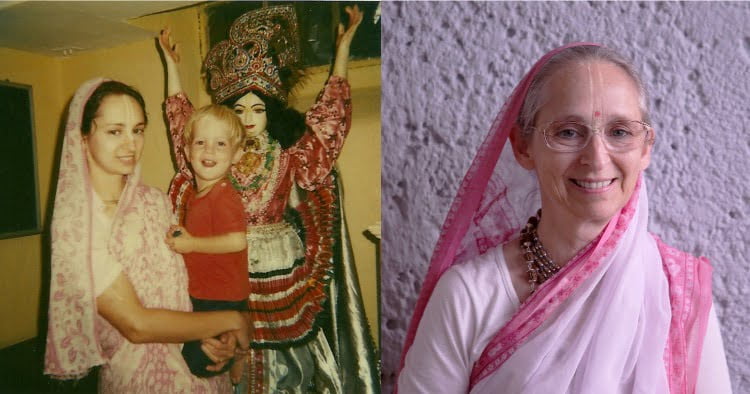Great-Grandmother Celebrates Multiple Generations Taking Up Bhakti
By Atma Tattva Das, ISKCON News Staff Writer | Apr 28, 2023

Urmila Devi Dasi (Dr. Edith Best), an initiated disciple of A.C. Bhaktivedanta Swami Prabhupada, feels very blessed that multiple generations of her family have taken up Vaishnava bhakti. As a practitioner and teacher of Bhakti Yoga since 1973, she regularly visits temples and holy places worldwide to hold discourses on topics of yoga, mantra meditation, and living in spiritual consciousness within the world. She also publishes articles and books for adults and children on the science of bhakti. We explored with Urmila her vision and best practices for educating our children.
Urmila has deep conviction in the conclusions of the scriptures that children are persons first. Therefore, these souls must be nurtured and developed to become good people with a deep sense of purpose. To raise Krishna-conscious children, parents or guardians do well to genuinely care about their children’s welfare as spiritual beings and build veritable connections toward realizing the meaning of human life. This commitment involves a deep sense of understanding, empathy, and intuition to know how to cultivate the children’s unique nature, personality, and intelligence toward transcendence.
“One important way to help a child’s spiritual welfare is through inspiring stories. Our stories are how we make sense of the world,” says Urmila. “Stories give us a chance to practice being somebody. When we’re hearing, reading, or watching a story, we are, in a genuine sense, practicing being the characters in that story. And stories are how we establish a model of the good and bad guys. Stories are one of the primary ways a person’s character and values are built, and it’s a crucial way in which every human society communicates values and cultures to its members, especially children. You’re much more likely to be honest by hearing stories about honest people that you can identify with than just being told to be honest.”

Urmila with her family at the New York temple in 1980.
Urmila highlights the importance not just of stories but also suggests that parents identify meaningful service opportunities that align with their children’s inclinations to help them develop their Krishna consciousness. This can involve finding activities that encourage cooperation, creative thinking, the development of an adroit sense of emotional intelligence, and cultivating a desire to benefit others.
Encouragement, negotiation, and positive reinforcement are crucial in raising children to be good, Krishna-conscious people. However, practicing those requires patience and a willingness to balance providing guidance and allowing children the freedom to explore and develop their Krishna consciousness in their own way.
Urmila emphasizes the need for community devotional schools, stating that “Prabhupada says the leaders of the Hare Krishna movement should start schools worldwide. Sociologists who study religion say that no religion will survive without enough children, and enough children who are actually socialized into that religion,” she continued, “Homeschooling offers things that you can’t do in school… you can work by the child’s interest in homeschooling much more easily. But a formal school also has things that a homeschool can’t do. For instance, input from other children in a formal school setting is invaluable in a child’s development, and traditional schools usually have more resources. Also, not all parents are well equipped or willing to homeschool their children for various reasons. So, it’s hard to build communities without schools.”
In conclusion, Urmila’s experiences and insights show that raising a fourth-generation Krishna-conscious family requires a deep understanding of what it means to be a spiritualist and how to build authentic relationships of love and trust with children. Parents must want to be with their children, not just to get something done or care for their needs. They have to spend time with them, listen to their concerns, and try to get to know them as people, separate from the hopes and dreams they may have for them.
For more information about Urmila’s upcoming book, “Career Dharma,” please add your name to this list. You can also find many additional resources on her website or by visiting her YouTube page.














